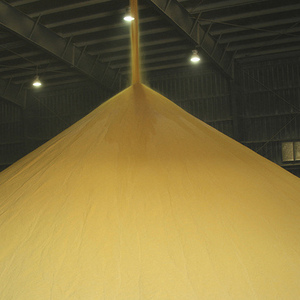Commodities: Anti-dumping rumors creates DDGS trading dynamic

FILE PHOTO
December 31, 2015
BY Sean Broderick, CHS
At the end of December the market paid as much attention to announcements out of China as it did to managing logistics going into the Christmas and New Year holidays. The Chinese minister of commerce recently announced that they were going to accept a petition from their domestic ethanol industry, accusing the U.S. of dumping DDGS. This is seen as a beginning step to filing an anti-dumping complaint to the World Trade Organization. This has been rumored for a while, which is creating an unusual dynamic, as some are buying more than normal to ensure there is a supply available in China if it does get filed, while others have been on the sidelines, fearful of a shipment being placed in limbo due to a quick change in import parameters. Falling export numbers to China reported lately would suggest that a lot are erring on the side of caution.
At the numbers DDGS are trading currently, below the value of corn, there has been a pickup in North American demand. There is generally an increase in domestic U.S. demand once the weather begins to cool but traders have also seen good demand from Mexico and Canada. Hopefully, Congress will take steps to ensure the U.S. is not afoul of the WTO determination that Country of Origin Labeling (COOL) is illegal by repealing it. Losing demand from our border neighbors would impact prices adversely.
With an eye on China, ethanol producers are hopeful of a similar price action of DDGS to last year around this time, when there was an $80 per ton surge in prices. With the downward price of ethanol lately, any price increase in DDGS will be warmly welcomed.
Advertisement
Advertisement
Advertisement
Advertisement
Related Stories
The U.S. exported 31,160.5 metric tons of biodiesel and biodiesel blends of B30 and greater in May, according to data released by the USDA Foreign Agricultural Service on July 3. Biodiesel imports were 2,226.2 metric tons for the month.
CARB on June 27 announced amendments to the state’s LCFS regulations will take effect beginning on July 1. The amended regulations were approved by the agency in November 2024, but implementation was delayed due to regulatory clarity issues.
Legislation introduced in the California Senate on June 23 aims to cap the price of Low Carbon Fuel Standard credits as part of a larger effort to overhaul the state’s fuel regulations and mitigate rising gas prices.
The government of Brazil on June 25 announced it will increase the mandatory blend of ethanol in gasoline from 27% to 30% and the mandatory blend of biodiesel in diesel from 14% to 15%, effective Aug. 1.
The U.S. EIA reduced its 2025 and 2026 production forecasts for a category of biofuels that includes SAF in its latest Short-Term Energy Outlook, released June 10. The forecast for 2025 renewable diesel production was also revised down.
Upcoming Events









